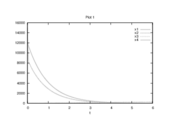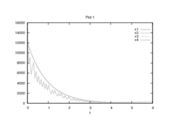Difference between revisions of "D'Onofrio model (binary variant)"
ClemensZeile (Talk | contribs) |
ClemensZeile (Talk | contribs) (→Reference Solutions) |
||
| (2 intermediate revisions by the same user not shown) | |||
| Line 32: | Line 32: | ||
The parameters and scenarios are as in [[D'Onofrio_chemotherapy_model]], the new fixed parameters are | The parameters and scenarios are as in [[D'Onofrio_chemotherapy_model]], the new fixed parameters are | ||
| − | <math>(c_{0,1},c_{0,2},c_{0,3},c_{0,4})=(u_0^{max},u_0^{max},0,0), | + | <math>(c_{0,1},c_{0,2},c_{0,3},c_{0,4})=(u_0^{max},u_0^{max},0,0), \qquad |
| − | (c_{1,1},c_{1,2},c_{1,3},c_{1,4})=(0, | + | (c_{1,1},c_{1,2},c_{1,3},c_{1,4})=(0,u_1^{max},u_1^{max},0). |
</math> | </math> | ||
== Reference Solutions == | == Reference Solutions == | ||
| − | If the problem is relaxed, i.e., we demand that <math>w(t)</math> be in the continuous interval <math>[0, 1]</math> instead of the binary choice <math>\{0,1\}</math>, the optimal solution can be determined by | + | If the problem is relaxed, i.e., we demand that <math>w(t)</math> be in the continuous interval <math>[0, 1]</math> instead of the binary choice <math>\{0,1\}</math>, the optimal solution can be determined by using a direct method such as collocation or Bock's direct multiple shooting method. |
| − | |||
| − | + | The optimal objective value of scenario 2 of the relaxed problem with <math> n_t=6000, \, n_u=100 </math> is <math>19.3561387</math>. The objective value of the binary controls obtained by Combinatorial Integral Approimation (CIA) is <math>169.45773</math>. The binary control solution was evaluated in the MIOCP by using a Merit function with additional Mayer term | |
| − | + | <math> 100 \max\limits_{t\in[0,1]}\{0,x_2(t)-x_2^{max}\}+1000 \max\limits_{t\in[0,1]}\{0,x_3(t)-x_3^{max}\} </math>. | |
| − | + | ||
| − | </ | + | |
| + | <gallery caption="Reference solution plots" widths="180px" heights="140px" perrow="2"> | ||
| + | Image:DonofrioRelaxed 6000 60 1.png| Optimal relaxed differential states determined by an direct approach with ampl_mintoc (Radau collocation) and <math>n_t=6000, \, n_u=100</math>. | ||
| + | Image:DonofrioCIA 6000 60 1.png| Optimal binary differential states determined by an direct approach (Radau collocation) with ampl_mintoc and <math>n_t=6000, \, n_u=100</math>. The relaxed controls were approximated by Combinatorial Integral Approximation. | ||
| + | </gallery> | ||
== Source Code == | == Source Code == | ||
Model description is available in | Model description is available in | ||
| − | * [[:Category:AMPL | AMPL code]] at [[ | + | * [[:Category:AMPL | AMPL code]] at [[D'Onofrio model, binary variant (AMPL)]] |
Latest revision as of 16:33, 11 January 2018
| D'Onofrio model (binary variant) | |
|---|---|
| State dimension: | 1 |
| Differential states: | 4 |
| Discrete control functions: | 4 |
| Path constraints: | 2 |
This site describes a D'Onofrio model variant with four binary controls instead which of only two continuous controls. The continuous controls are replaced via the outer convexifacation method.
Mathematical formulation
For ![t \in [t_0, t_f]](https://mintoc.de/images/math/5/5/8/55823791d9100bcb5461801aff4f6edd.png) the optimal control problem is given by
the optimal control problem is given by
![\begin{array}{llcl}
\displaystyle \min_{x, u} & x_0(t_f) &+& \alpha \int_{t_0}^{t_f} u_0(t)^2 \text{d}t \\[1.5ex]
\mbox{s.t.} & \dot{x}_0 & = & - \zeta x_0 \text{ln} \left( \frac{x_0}{x_1} \right) - \sum\limits_{i=1}^{4} w_i\;c_{1,i}\; F \; x_0 , \\
& \dot{x}_1 & = & b x_0 - \mu x_1 - d x_0^{\frac{2}{3}}x_1 -\sum\limits_{i=1}^{4} w_i c_{0,i} \; G x_1 - \sum\limits_{i=1}^{4} w_i\;c_{1,i} \; \eta x_1, \\
& \dot{x}_2 & = & \sum\limits_{i=1}^{4} w_i\;c_{0,i}, \\
& \dot{x}_3 & = & \sum\limits_{i=1}^{4} w_i\;c_{1,i}, \\ [1.5ex]
& x_2 & \leq & x_2^{max}, \\
& x_3 & \leq & x_3^{max},\\
& 1 &=& \sum\limits_{i=1}^{4}w_i(t), \\
& w_i(t) &\in& \{0, 1\}, \quad i=1\ldots 4.
\end{array}](https://mintoc.de/images/math/7/8/6/786dadd722eb90f8af8959226181d037.png)
Parameters
The parameters and scenarios are as in D'Onofrio_chemotherapy_model, the new fixed parameters are

Reference Solutions
If the problem is relaxed, i.e., we demand that  be in the continuous interval
be in the continuous interval ![[0, 1]](https://mintoc.de/images/math/c/c/f/ccfcd347d0bf65dc77afe01a3306a96b.png) instead of the binary choice
instead of the binary choice  , the optimal solution can be determined by using a direct method such as collocation or Bock's direct multiple shooting method.
, the optimal solution can be determined by using a direct method such as collocation or Bock's direct multiple shooting method.
The optimal objective value of scenario 2 of the relaxed problem with  is
is  . The objective value of the binary controls obtained by Combinatorial Integral Approimation (CIA) is
. The objective value of the binary controls obtained by Combinatorial Integral Approimation (CIA) is  . The binary control solution was evaluated in the MIOCP by using a Merit function with additional Mayer term
. The binary control solution was evaluated in the MIOCP by using a Merit function with additional Mayer term
![100 \max\limits_{t\in[0,1]}\{0,x_2(t)-x_2^{max}\}+1000 \max\limits_{t\in[0,1]}\{0,x_3(t)-x_3^{max}\}](https://mintoc.de/images/math/5/0/e/50e1051d781839fd5f6e130da2b9f5b3.png) .
.
- Reference solution plots
Source Code
Model description is available in

